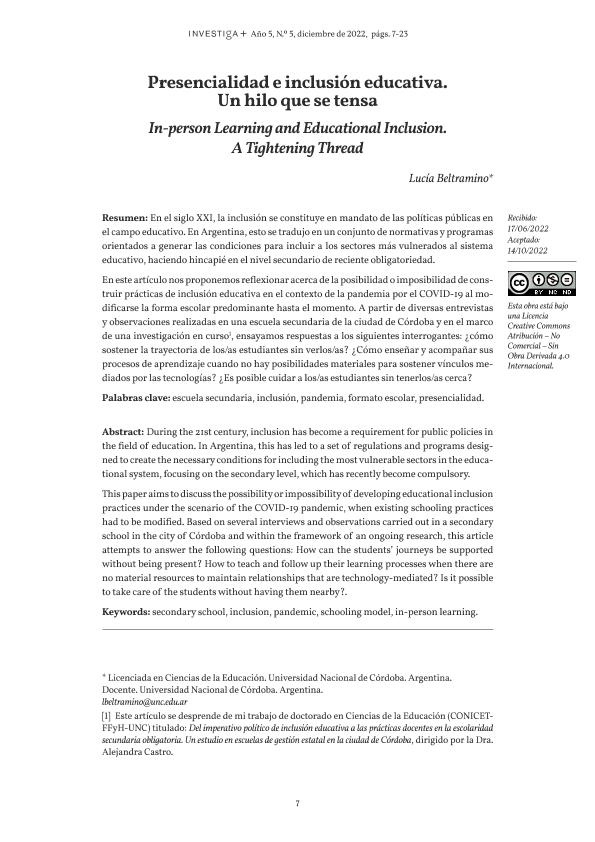Mostrar el registro sencillo del ítem
dc.contributor.author
Beltramino, Lucia

dc.date.available
2023-10-23T18:00:11Z
dc.date.issued
2022-12
dc.identifier.citation
Beltramino, Lucia; Presencialidad e inclusión educativa: Un hilo que se tensa; Universidad Provincial de Córdoba; Investiga+; 5; 5; 12-2022; 1-17
dc.identifier.issn
2618-4370
dc.identifier.uri
http://hdl.handle.net/11336/215700
dc.description.abstract
En el siglo XXI, la inclusión se constituye en mandato de las políticas públicas en el campo educativo. En Argentina, esto se tradujo en un conjunto de normativas y programas orientados a generar las condiciones para incluir a los sectores más vulnerados al sistema educativo, haciendo hincapié en el nivel secundario de reciente obligatoriedad.En este artículo nos proponemos reflexionar acerca de la posibilidad o imposibilidad de construir prácticas de inclusión educativa en el contexto de la pandemia por el COVID-19 al modificarse la forma escolar predominante hasta el momento. A partir de diversas entrevistas y observaciones realizadas en una escuela secundaria de la ciudad de Córdoba y en el marco de una investigación en curso, ensayamos respuestas a los siguientes interrogantes: ¿cómo sostener la trayectoria de los/as estudiantes sin verlos/as? ¿Cómo enseñar y acompañar sus procesos de aprendizaje cuando no hay posibilidades materiales para sostener vínculos mediados por las tecnologías? ¿Es posible cuidar a los/as estudiantes sin tenerlos/as cerca?.
dc.description.abstract
During the 21st century, inclusion has become a requirement for public policies in the field of education. In Argentina, this has led to a set of regulations and programs designed to create the necessary conditions for including the most vulnerable sectors in the educational system, focusing on the secondary level, which has recently become compulsory. This paper aims to discuss the possibility or impossibility of developing educational inclusion practices under the scenario of the COVID-19 pandemic, when existing schooling practices had to be modified. Based on several interviews and observations carried out in a secondary school in the city of Córdoba and within the framework of an ongoing research, this article attempts to answer the following questions: How can the students’ journeys be supported without being present? How to teach and follow up their learning processes when there are no material resources to maintain relationships that are technology-mediated? Is it possible to take care of the students without having them nearby?.
dc.format
application/pdf
dc.language.iso
spa
dc.publisher
Universidad Provincial de Córdoba
dc.rights
info:eu-repo/semantics/openAccess
dc.rights.uri
https://creativecommons.org/licenses/by-nc-nd/2.5/ar/
dc.subject
ESCUELA SECUNDARIA
dc.subject
INCLUSIÓN
dc.subject
PANDEMIA
dc.subject
FORMATO ESCOLAR
dc.subject
COVID-19
dc.subject.classification
Educación General

dc.subject.classification
Ciencias de la Educación

dc.subject.classification
CIENCIAS SOCIALES

dc.title
Presencialidad e inclusión educativa: Un hilo que se tensa
dc.title
In-person Learning and Educational Inclusion: A Tightening Thread
dc.type
info:eu-repo/semantics/article
dc.type
info:ar-repo/semantics/artículo
dc.type
info:eu-repo/semantics/publishedVersion
dc.date.updated
2023-10-23T17:01:06Z
dc.journal.volume
5
dc.journal.number
5
dc.journal.pagination
1-17
dc.journal.pais
Argentina

dc.description.fil
Fil: Beltramino, Lucia. Consejo Nacional de Investigaciones Científicas y Técnicas; Argentina. Universidad Nacional de Córdoba. Facultad de Filosofía y Humanidades. Centro de Investigaciones María Saleme Burnichón; Argentina. Consejo Nacional de Investigaciones Científicas y Técnicas. Centro Científico Tecnológico Conicet - Córdoba; Argentina
dc.journal.title
Investiga+
dc.relation.alternativeid
info:eu-repo/semantics/altIdentifier/url/https://revistas.upc.edu.ar/investiga-mas/article/view/100
Archivos asociados
